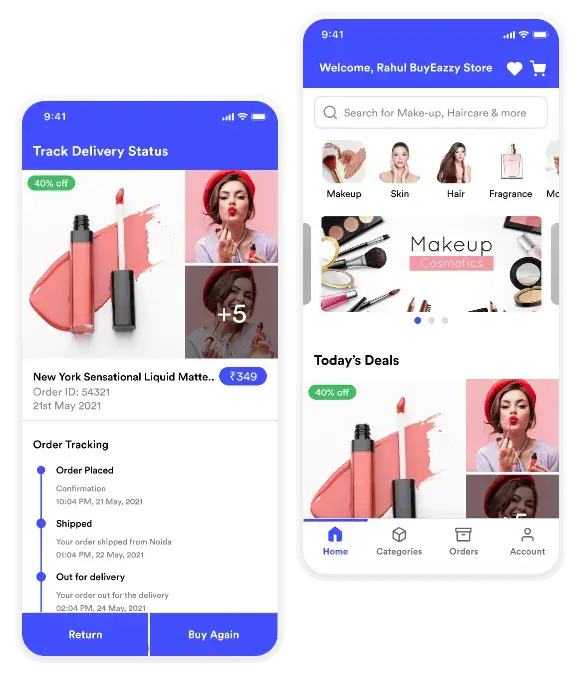The online gaming app market is more significant than it has ever been. Many players are online, gaming on mobile devices, computers, casinos, or streaming multiplayer action with a group of friends on Twitch. Besides, there is a strong surge in live sports streaming apps. However, whatever the type is, that requires closure look before moving on to such app development process. The internet was advertised as a device that could unite the world; indeed, it did in gaming. However, one caveat: online gaming app development brings people together and makes people more vulnerable than ever before.
As cybercrime and the theft of personal data rise daily, it’s imperative to safeguard users whenever they play on the internet. While the players are responsible for this, most responsibility rests with the companies that handle their personal and financial information. This is why people and businesses continue to test using various methods to keep undesirable eggs from escaping. The ease and fun of gaming online can come with threats to your security and dangerous interactions. Technology has advanced to ensure secure and enjoyable online gaming app development for gamers of all levels.

In this blog, we’ll examine the threat of cyberattacks and how the latest technology has made the online gaming experience more secure than ever. Together, let’s ensure that online gaming app development is enjoyable gaming as well as being assured about personal safety.
Cyberattacks In Gaming: An Emerging Concern
In the past few years, cybersecurity has concentrated on companies and phishing attacks, which could result in the theft of personal data. However, as the number of cyberattacks increases, gamers are emerging as the most targeted for cybercriminals. Gaming is on the rise, and more gamers are entering virtual worlds, which makes them more susceptible to attacks from cybercriminals in gaming.
Young gamers are at high risk. These games are often played on parents’ devices, which may contain information hackers find intriguing. Let’s examine the motives for this growing security threat and consider ways gamers can defend themselves against dangers.
The exponential growth in the gaming industry has thrilled millions of people and drawn hackers looking to make a profit. Targeting gaming sites is becoming increasingly common. Hackers employ sophisticated methods to hack into users’ accounts, steal private information, and interfere with online gaming experience.

1. Stolen Credentials And In-Game Items
Cyberattacks usually occur because hackers seek to steal valuable items or account data from games. Virtual goods, such as rare skins, weapons, and characters, are real-world valuable. Hackers infiltrate weak passwords and security flaws to gain access to accounts and take valuable things to profit from them.
2. Ransom Attacks On Gaming Accounts
Ransomware threats have been increasing in the gaming industry. Cybercriminals access users’ accounts and demand ransom in exchange for the return. Hackers often ask for the payment of a cryptocurrency that cannot be tracked. Gamers typically follow these requirements to protect their carefully constructed gaming profiles, progress, and accomplishments.
3. Disruption Of Online Gaming Services
Besides targeting individual users, hackers have shifted their efforts towards gaming platforms, aiming to disrupt internet services. They use DDoS attacks (Distributed Denial-of-Service attacks) to overwhelm servers and render them inaccessible to legitimate users. The result is not just a source of anger among gamers but also significant financial issues for gaming businesses. They have to bear the cost of defending themselves against these attacks and deal with the potential loss of revenue.

Hacked Accounts And Identity Theft: The Dark Side Of Online Gaming
The reason behind hacking accounts is easy to understand. There are numerous methods by which cybercriminals can gain money by stealing users’ login credentials. Simply typing in a Google search query incorporating an enticing game’s name and “cheats” or “hacks” can yield various results. Some are primarily search-optimized websites designed to entice gamers to click ads, complete surveys, or download potentially dangerous files.
Hackers may access a user’s account by developing a phishing website and a “hacking” tool that asks to see a user’s credentials. There are also methods similar to one utilized in the current Minecraft incident to get users to download an application that installs a keylogger or information-stealing malware onto the player’s system. Whatever the case, the outcome of these strategies is to access a user’s account.
After entering the victim’s account, the hacker can do various things to earn profits. Online gaming is filled with stories of lost and possibly stolen items in games, like accounts, players, or even characters being held for ransom. There are also credit card statements that show fraudulent purchases made in-game. Although the theft of virtual items (VR) could seem trivial to someone who doesn’t play, it’s serious for players who have put in hundreds of game hours and real money to acquire something valuable and robust. A hacker’s lost virtual object can be exchanged for money.
Additionally, gaming accounts on the internet are also likely to have personal information in addition to username and password, including the user’s name, birthdate, and mobile phone number, as well as an email address to confirm the identity as well as social network IDs, as well as a bank account with a credit card. These details are far more valuable than any in-game object because they may be sold through the underground market of cybercrime or be used to intrude on a victim’s privacy through email or other accounts on the internet.

Types Of Cybersecurity Attacks In Gaming
The entire gaming industry can be a lucrative area of attack for criminals. Gaming platforms typically have huge quantities of player data and players who frequently spend large amounts of money in online gaming, which makes them valuable targets. In addition, the competitive nature of games means that threats that disrupt a player’s play or present a player with an unfair advantage are frequent in these games.
1. DDoS Attacks
The Distributed Denial of Service attack is created to render the targeted site or service inaccessible to legitimate users. A botnet, made up of numerous computers that have been infected, can flood the target computer with massive amounts of unwanted requests. In consuming all the computer’s bandwidth on the network, as well as storage resources or computational power and storage, an attacker makes it ineffective at processing legitimate requests.
DDoS attacks have been widespread in gaming because players try to gain advantages over rivals. DDoS attacks are inexpensive, and an attacker who can make 20 to 50k requests per second for an entire day costs as little as $200. A successful attack can render the player ineligible to play for some time. A DDoS attack could ultimately ruin players’ chances of winning or cause the player to end a game.
2. Phishing Attacks
Phishing is a social engineering technique that utilizes tricks and coercion to force people to take action that benefits the perpetrator. A typical phishing attack is an email designed to lure a person to a malicious website that steals login credentials.
Phishing attacks target players in various ways, particularly in the gaming industry. Their most common use is stealing usernames and passwords to gaming websites. These accounts typically control access to important in-game objects that an attacker might take for personal usage or sale on marketplaces.
Another use of phishing attacks within gaming is to entice gamers into installing malware onto their gadgets. The phishing email or message in a gaming community might point to a website that advertises gratis versions of games or other modifications. If a user installs these applications, runs them, and installs them, they will install malware onto their system. The malware may be able to steal passwords and other personal information and perform other activities that affect their ability to play the game.
3. Man-In-The-Middle (MITM) Attacks
In a man-in-the-middle (MITM) or an on-path attack, a hacker places themselves in the communication path between the player and server. They can then intercept messages, read, modify, or delete them in the path. Websites are generally protected from MITM attacks thanks to the utilization of their Transport Layer Security (TLS) protocol to protect traffic and authentication. However, mobile applications typically lack security, which websites do not, as it’s difficult to tell if an application has implemented secure security measures.
In the realm of gaming, MITM attacks in the gaming industry hinder gameplay in different ways. The attacker who performs the MITM attack against a rival may be able to stop their activity or alter it to put the opponent at an advantage. The player could also carry out an MITM attack on themself to gain an advantage. This can be done even when using HTTPS-secured online games. For instance, an attacker could alter the game’s rules to increase efficiency or gain access to secret data about the game.
4. Credential Stuffing Attacks
Credential stuffing is yet another popular cyber-attack that aims to gain access to users’ accounts. In this scenario, an attacker uses weak and reused passwords, which is a frequent problem. With an array of passwords with weak security or passwords exposed by hacking or data breach attacks, attackers attempt to access the user’s account using other accounts.
Attacks on accounts that take over are a significant risk for the gaming field. Apart from the possibility of theft discussed previously, an attacker who has access to a player’s account may be able to delete the account. Also, they could perform another action that could negatively impact their gaming performance.
5. Data Breaches
A gaming business may possess various sensitive data. At a minimum, the company will possess personally identifiable information (PII), which includes a user’s name and address, as well as other information. Additionally, they’ll have credit cards to facilitate the purchase of games in-game and could also possess other information regarding their customers.
The accumulation of sensitive information is also a cause of concern for organizations. Hackers may attack these gaming platforms to obtain information for selling on the dark internet or use it in future attacks. Gaming platforms may also be a possibility where gamers seek to steal sensitive information to “dox” their opponents.

Tech Used For Safe And Immersive Online Gaming Experience
With several trending technologies getting integrated into online gaming app development, the appeal of gaming online has increased in a world that is becoming more digital. From casual games through social networks to more complex multiplayer games, gamers can connect and play online with endless possibilities. For online gaming app development, protecting players ‘ personal and financial details is the most critical aspect. It’s vital to avoid fraud and identity theft. Furthermore, sports and fantasy app development company now provides sophisticated encryption technology and secure login methods to safeguard players’ data.
Another aspect crucial to the safety of online gaming is controlling players’ behavior and interactions. Several gaming platforms have implemented rules for community members and enforcers to avoid harassment and other types of harmful conduct. Some games, for instance, permit players to report or block unwanted behavior. They may have moderators to supervise and respond to potentially hazardous instances.
Alongside safety, technology has dramatically enhanced the enjoyment and pleasure of gaming online. High-quality audio and graphics and the latest artificial intelligence technology and physics engines create immersive and realistic virtual environments. Virtual reality and Augmented Reality techniques are increasingly employed to enhance online gaming and provide players with a more thrilling online gaming experience.
The online gaming experience has also been made more interactive and social because of the growth of networking tools and communication technology. Game players can connect quickly and interact with one another via games’ chat options or an external application for video chat or voice. This facilitates greater collaboration and teamwork when playing multiplayer games, making more personal and enjoyable interactions between players.
A potential issue with online gaming is the possibility of addiction as well as a negative impact on the mental well-being of players. But, technology could assist in addressing the issues. As an example, specific gaming platforms have introduced capabilities that let players restrict and monitor their own gaming time and also provide guidelines for healthy gaming and help for those who struggle with addiction.
Apart from the safety and enjoyment benefits offered by technology for online gaming, it has also created new possibilities to play professional games and esports. Thanks to the ease of communicating and competing online, gamers can take part in tournaments organized by organizations and events that have huge prize money. The result is a growing Esports business, which includes professional teams, sponsors, and even dedicated esports arenas and tournaments.
In addition, the rapid growth of streaming platforms has allowed the broadcasting of these tournaments and the rise of a dedicated online sports audience. The streaming platform not only entertains the viewers but also facilitates the exploration and development of new players.

How Can You Protect Yourself From Harms Associated With Online Gaming?
It’s fun to play online; however, to ensure safety, it is essential to maintain the art of cyber-sanity. You must learn about how blockchain helps in gaming platform. Below are some tips to take:
1. Use Strong Passwords
Creating a strong password is one of the most straightforward ways to ensure security. A secure password comprises at least 12 characters (ideally more excellent). It includes lower and uppercase numerals, letters, and other symbols. It avoids obvious passwords’ use of sequential numerals (“1234”) and any personal data that anyone familiar with may guess.
For example, the day of your birth or the pet’s name. Managing multiple passwords can be a challenge; therefore, the password manager may assist.
2. Create Multi-Factor Authentication
If the distributor or game has two- or multi-factor authentication, you should enable it. This is an additional step in the login process, like sending a code to your mobile account or email. Multi-factor or two-factor authentication adds additional security to your gaming account. Some games also offer game-specific rewards for players who use the feature.
3. Secure Your Private Information
Do not include personal information within your usernames for gaming – like your name, birth date, birth, or even your address – and don’t share personal information in gaming forums. If you use a gaming headset, be conscious of any personal details you share publicly.
4. Always Download Legitimately From Reputable Sources
Ensure your PC is protected by not downloading files from illegal sources. It doesn’t matter if it’s games, add-ons from third parties, or cheating codes; downloads from pirated or non-official sources could introduce infections or games on your computer. Use reputable sites to download and ensure maximum game security.
5. Choose a Safe Username
The possibility of remaining anonymous online differs based on the game platform. Certain games allow users to create whatever screen name they want and then choose the “avatar” or online image for their avatar to portray them. Select an account name that does not contain your real name or any other identifiable information for accounts and profiles.
6. Be Wary Of Concealed Charges In Addition To Possible Fraud
Check the publisher or hosting provider’s guidelines and terms to ensure you know of any current or upcoming hidden costs. Watch out for possible scams while buying or selling property that is part of computer games.
7. Be On Guard Against Emails That Are Phishing
Sports betting app development company advises that beware of emails in which you must call or click to access an attachment in minutes. The best advice is not to click on all links, open attachments, or reply to any email you are uneasy about.
8. Safely Remove Your Gaming Equipment
Let go of your gaming console, whether selling it, scrapping the device, or giving it away, to ensure your data is erased. Methods to complete this will depend on the gadget. Still, from a privacy point of view, it’s essential to erase your account information and back up your games on your new device if appropriate.
9. Be Careful What You Share
It is common for users to have a choice regarding what personal or contact details they want to disclose to the other players through their online profile or chat conversations with fellow gamers. Since games can cross over from discussions within the game to the real world, privacy and security issues worries could grow.
The game may connect a player’s online activity to a particular area, allowing other players to communicate with them. However, the information may be used to harass and stalk. Keep your information private by not sharing identifying or personal information.
10. Use And Install a VPN For Gaming
If you are a gamer using a desktop computer, safeguarding your personal identity is essential. If you are using a virtual private network, known as a VPN, your computer will appear to be located elsewhere from the outside world, which prevents hackers from locating it.
VPNs are simple to install and need only minimal installation and configuration. Even the benefits of VPNs include:
- You are enhancing your security against threats, including DDoS, that can be employed against online gaming competitors, especially during competitive gaming scenarios.
- Security is extra when carrying out banking transactions and data, as VPNs offer a secure connection.
Other Important Tips For Players To Ensure Privacy And Security
Video games aren’t just reserved for gamers anymore. With the availability of a range of gaming platforms, from personal computers and consoles to smartphones, handhelds, and tablets, the number of players all over the globe has transformed the gaming industry into one of the fastest-growing industries in the world. The industry’s popularity and size make gaming platforms and gamers the perfect target for cybercriminals who see gaming as an opportunity to steal user data, disrupt security, or spread dangerous malware and content.
Therefore, players must be cognizant of the security risks involved, particularly when most of the top games today have an online element or pay-as-you-play model that allows in-game accessories and items to be purchased with actual money. Here are a few tips regarding how you can protect the security of your data and avoid games-related risks:
- If you sign up to create an account for gaming, look through the information on your account and identify which are essential to your game experience. Although revealing your actual name, address, and date of birth could be a requirement, this doesn’t mean that players must provide accurate information. Would you want the game to have your actual name and address? This is the same for the email address you need.
The most dedicated gamers should establish a separate account for game registration to separate it from emails that include the address book, contact details, and information to verify other accounts, such as bank accounts on the web or through social media.
- If you need information or tips that can enhance your gaming experience, avoid accessing untrusted websites and downloading software from untrusted sources. Players are also advised not to use their game login credentials to access third-party websites or applications.
- If you aren’t planning to purchase items in the game, do not link your debit or credit card information to a gaming account. If you plan to shop online, ask your card company whether they provide an online verification option to verify online transactions. Also, you should regularly check your bank accounts to make sure that there are no fraudulent transactions.
- Install trustworthy security software that can detect harmful hyperlinks and spam. You should also regularly check your system for malware to be sure your computer is safe from malware.

Conclusion
Many gaming firms are taking steps to ensure more secure and safe gaming for their users. A comprehensive strategy could be used to create a more significant effect. Mobile application development offers an excellent chance for the gaming industry to take self-regulatory steps, allowing for the industry’s continued expansion and safeguarding younger customers.
If managed effectively, the tech-driven sector, like gaming online, has positive outcomes, including cognitive functions, increasing social abilities, and narrowing the digital divide and entertainment. Industry meet-ups and feedback mechanisms should be essential in creating a long-term gaming industry.
These technological advances can remain a blessing for the gaming industry’s growth as long as we can work in tandem to find ways to address the issues that arise.
However, did you know that Techugo, a mobile app development company, would be an ideal choice to partner for secure online gaming app development? Well, yes. Techugo has a proven track record of developing secure and reliable gaming applications that adhere to the highest industry standards for user safety and data security. Their expertise in mobile application development makes them a valuable partner in creating a secure and enjoyable gaming experience for users. Get in touch with them today!
Post Views: 1,408




 SA
SA
 KW
KW
 IE
IE AU
AU UAE
UAE UK
UK USA
USA
 CA
CA DE
DE
 QA
QA ZA
ZA
 BH
BH NL
NL
 MU
MU FR
FR
































